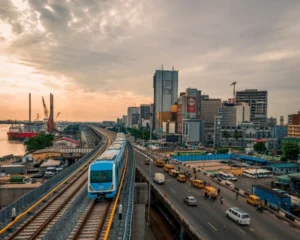Nigeria’s economy is teetering — driven into crisis by fuel instability, soaring prices, and broken promises. Here’s a deep dive into how the current administration triggered nationwide hardship, and why many Nigerians feel abandoned. Eyes Of Lagos reports,
🔥 Fuel Shock & Economic Turmoil
-
In May 2023, President Bola Tinubu eliminated decades‑old fuel subsidies, sending petrol prices skyrocketing — tripling at the pump overnight. Inflation surged to 30‑year highs, deeply impacting everyday Nigerians.
-
Transport costs ballooned: commuter fares and e‑hailing rates soared, squeezing both consumers and drivers alike .
-
A survey by Afrobarometer (March 2025) found overwhelming opposition: citizens report rising food prices, transport inflation, and pervasive fear for the future.
🌍 Socio‑Economic Fallout
-
Families across cities like Ondo report incomes insufficient for basic needs. Fuel prices jumped from ₦160 to ₦650–₦1,000 within months, pushing households into poverty, dropping school attendance, and reducing savings.
-
In Ngwoma village, residents are virtually trapped: lack of fuel means limited travel for health, education, or markets. Local nurse Blessing Onukogu now runs a makeshift clinic as hospitals become unaffordable .
-
Up to 31.8 million Nigerians now face acute food shortages — a steep rise from 18.6 million in 2023 — attributed to subsidy removal and rising insecurity .
💔 Government Failures: Promises vs Reality
-
Tinubu’s rhetoric framed subsidy removal as economic “shock therapy” — promising long‑term growth and stability. But critics argue that the strategy lacked planning, transparency, or social safety nets for the vulnerable .
-
The IMF has warned that Nigeria’s 2025 budget relies on over‑optimistic oil price and production estimates (~$75/barrel vs ~$68), and urged expansion of cash‑transfer programs — a need unmet so far.
🧠 Why the Government Is Falling Short
-
Policy implementation without cushioning: Subsidies removed, but no robust financial assistance funded. Those savings (~2% of GDP) weren’t transparently reinvested into public welfare .
-
Structural constraints: Oil theft continues to bleed national revenue. Production remains far below targets, weakening fiscal resilience .
-
Escalating insecurity and inflation: Insecurity and high living costs amplify poverty — making recovery elusive for many lived realities .
📈 The Path Ahead – Or Lack Thereof
While economic reforms such as currency liberalization and tighter monetary policy are commendable in theory, the execution has hurt ordinary citizens worst. Without targeted relief, transparency in subsidy-savings allocation, and credible social safety nets, reforms ring hollow .
In short: Fuel instability has morphed into a national crisis — not only disrupting markets, but eroding trust in leadership and amplifying inequality.
🧩 What Must Change
-
Transparency: Show Nigerians exactly where fuel savings go.
-
Relief for the vulnerable: Expand targeted cash transfers, social welfare, and support for rural markets.
-
Long‑term strategy: Invest in infrastructure, agriculture, and reliable energy transitions (e.g., CNG uptake) to cushion effects







